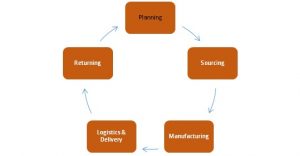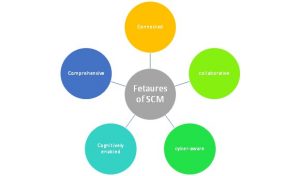By: Bushra Sarwar
Introduction:
What is Supply Chain Management?
Supply chain management (SCM) is the successful management of supply chain operations to gain competitive advantages and customer satisfaction. It reflects a concerted attempt by supply chain organisations to build and manage supply chains in the most reliable and possible profitable ways (Kapoor, Vyas & Dadarwal, 2018). Or
SCM is the handling of a good or service’s entire manufacturing flow, starting from the raw components all the way to providing the finished product to the customer. A business establishes a network of suppliers that transfer the commodity from raw material suppliers to those organizations that directly communicate with customers.
Learn more about Supply Chain Management with Enhelion’s Online course certified by Sahil Malhotra!
Core Concept of Supply Chain Management:
- Involvement of multiple organizations to transfer the product from origination point to end customer.
- Most organizations are restricted to their own activities which are happening inside the organization related to SCM, while few businesses understood the managed activities of supply chain for delivering the product to end user.
Flow in Supply Chain Management:
- Physical Flow
- Information flow
Physical flow is the most seeable part of SCM, which involve movement and transfer of goods from one place to another place.
Information flow involves the coordination of daily information about transfer of goods among various members of supply chain.
Working of Supply Chain Management:

Figure 1 Working of Supply Chain Management
Source: IBM
Five C’s of Supply Chain Management:

Figure 2 Five C’s of Supply Chain Management
Modern features of SCM are connectivity with the social media and modern disruptive technologies like IOT (Internet of things), AI (Artificial Intelligence), ML (Machine Learning) etc. collaboration among the supplier by using cloud computing to enable collaboration with many enterprises. Cyber-aware is the most important part to protect the supply chain from cyber attack and malicious malware. Controlling of supply chain through AI enabled platform to make it more automated. Usage of analytics for scale up the information in real time, which is comprehensive and fast. Predictive analytics help to predict future demand based on historical data.
Overview of Pharmaceutical Industry:
India’s presence in worldwide pharmaceuticals is prolific and rapidly expanding. It is the world’s largest supplier of generic drugs, having a 20 percent share of global supply by volume, and also supplies 62 percent of global vaccine demand. India secures 3rd position in production of medicines and14th place in terms of value. India is the only country outside of the USA with the highest number of US-FDA compliant pharmaceutical plants (more than 262, including Active Pharmaceutical Ingredients). More than 2000 WHO-GMP (World Health Organization-Good Manufacturing Practice) sanctioned pharma plant and 300 EDQM (European Directorate of Quality Medicines) plants in India.
60,000 generic brands are produced in India across 60 categories. India is home to more than 3000 companies with a fast and secure network of 10,500 manufacturing facilities (Invest India). Export in Pharmaceutical industry is growing with a growth of 10.72% every year. Cost of production is 33% lower in India in comparison to US market, which attracts most of the companies to open their pharma plants in India.
Learn more about Supply Chain Management with Enhelion’s Online course certified by Sahil Malhotra!
Top 10 Pharmaceutical companies in India and worldwide:
| Indian Companies | Revenue (Billion US $) | Global Companies | Revenue (Billion US $) |
| Sun Pharmaceuticals | $4.2bn | Johnson & Johnson | $56.1bn |
| Dr Reddys | $2.4bn | Pfizer | $51.75bn |
| Divi’s Laboratories Ltd | $2.3bn | Roche | $49.23bn |
| Cipla | $2.5bn | Novartis | $47.45bn |
| Aurobindo Pharma | $1.9bn | Merck & Co. | $46.84bn |
| Torrent Pharmaceuticals Ltd | $1.5bn | GlaxoSmithKline | $44.27bn |
| Lupin | $1.2bn | Sanofi | $40.46bn |
| Zydus Cadilla | $1.0bn | AbbVie | $33.26bn |
| Abbott India | $1.7bn | Takeda | $30.52bn |
| Alkem Laboratories | $1.8bn | Shanghai Pharmaceuticals Holding | $26.69bn |
Source: Pharmaceutical-technologies.com
Supply Chain Management in Pharmaceutical Industry:
Pharmaceutical companies do not have flexible, cost-efficient and robust supply chain (Pwc report-Pharma 2020). Figure 1 presents the supply chain of pharmaceutical industry. It covers the innovation and development of new product, manufacturing, packaging, distribution to wholesaler, retailer, and pharmacy and directly to patient. Presently pharmaceutical companies are not working on JIT (Just in time) basis, or producing on demand basis, rather they produce the things, store it in the warehouse and decrease the cost efficiency of companies.

Figure 3 Supply Chain of Pharma Company
Source: Pwc
The pharmaceutical supply chain involves a wide variety of stakeholders; including suppliers, wholesale distributors, and pharmacy benefit managers. The stakes are high for pharmaceutical firms in such a dynamic phase. Drugs that are improperly marketed damage both the credibility and customer loyalty of the organization, as well as future benefit. An inefficient supply chain can disturb the health of patient and create disruptive effect on public health.
Challenges in SCM of pharmaceutical industry:
Major challenges in pharma industry is to maintain the quality of drugs, delivery on time, network of supplier, mode of transportation etc. Few drugs need optimum temperature during transportation from one place to another which became a challenge if temperature is not maintained (Shah, 2004). Recently in news temperature of -80degree Celsius is required during transportation to maintain the quality. So, here emerging technologies like block chain can help to monitor the temperature of vaccine.
Best practices in Pharmaceutical Industry:
In recent years, the pharmaceutical industry has become highly competitive. The rise of counterfeit medications, stringent quality regulations and serialized mandates has been seen. This made it important for the pharmaceutical industry’s supply chain to be strong and traceable. Hill (2019) discussed five best practices to be applied in pharmaceutical supply chains.
Associate and Consort with digital business network
The cornerstone of a multi-enterprise supply chain is a digital business network. This electronically links all of the supply chain partners across the cloud. It makes it possible for them to work together in sync when pharmaceutical supply chain partners are related. This offers end-to-end visibility and an incentive for multiple business interactions to collaborate.
Evaluate manufacturing Practices
Analyze in depth the manufacturing process. Focus on the collection of good quality practices required so that all goods are consistent across all batches. Implement sound measuring practices to guarantee that a drug’s recipe is not contaminated.
Corroborate traceability
In order for pharma companies to have visibility into the development of their partners, end-to-end traceability is important. This will assist them to manage the consistency of the commodity across the multi-enterprise, multi-tier supply chain. Companies can use block chain technology, Internet of things to ensure the traceability in the supply process of medicines.
Learn more about Supply Chain Management with Enhelion’s Online course certified by Sahil Malhotra!
Respond to change in Demand
In order to identify and respond to changes in supply and demand, pharmaceutical supply chain management must be robust. You will analyse knowledge in real time through the implementation of state-of-the-art planning applications. Share it with your supply chain partners immediately if you notice an unexpected shift in demand or a supply interruption.
Transparency in Inventory
It is also essential to assign transportation, warehousing and other value-added services to various channels. Get full visibility of inventory downstream and enforce good shipping practices. This will ensure that the destination is reached by your pharmaceutical goods without losing the quality. Transparency will increase the confidence among the partners and stakeholders of supply chain.
Conclusion:
This write-up describes about the supply chain management in pharmaceutical industry. It includes basic concept of supply chain management, flows (information and physical) of supply chain management, working of supply chain management and five C’s of SCM. This study also describes the overview of pharmaceutical industry, top 10 companies worldwide and in India. Role of supply chain management in pharmaceutical industry is also discussed. Effective supply chain management can create the efficient supply of drugs to end users. Major challenges in the SCM are to maintain the quality of drugs, on time delivery etc, which can be resolved by using emerging technologies like block chain, IoT and AI. Finally write-up concludes with the best practices followed in the pharmaceutical industry.
References:
Kapoor, D., Vyas, R. B., & Dadarwal, D. An Overview on Pharmaceutical Supply Chain: A Next Step towards Good Manufacturing Practice. Drug Des Int Prop Int J 1 (2)-2018. DDIPIJ. MS. ID, 107.
Mehralian, G., Zarenezhad, F., & Ghatari, A. R. (2015). Developing a model for an agile supply chain in pharmaceutical industry. International Journal of Pharmaceutical and Healthcare Marketing.
Shah, N. (2004). Pharmaceutical supply chains: key issues and strategies for optimisation. Computers & chemical engineering, 28(6-7), 929-941.
Pwc Report (2020):Pharma 2020-Supplying the future. Retrieved from https://www.pwc.com/gx/en/pharma-life-sciences/pharma-2020/assets/pharma-2020-supplying-the-future.pdf
Hill, K(2019). Five best practices of Pharmaceutical Supply Chain Management. Retrieved from https://www.epmmagazine.com/opinion/5-best-practices-that-pharmaceutical-supply-chain-management/
Wesources:
www.Google.com
www.Ibm.com
www.Pharmaceutical-technologies.com
www.InvestIndia.com
Learn more about Supply Chain Management with Enhelion’s Online course certified by Sahil Malhotra!